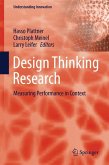Special emphasis is placed on exploring new approaches to design thinking education, making headway on the goals of the research program, namely to fuel creativity and establish improved content for the teaching and learning of designthinking. This volume also presents a broad range of findings on effective team interaction. Moreover, researchers present their findings on tools that support design thinking practices, and showcase concrete applications.
The results of this rigorous academic research are not only intended to benefit the scientific community, but will hopefully find their way to many other readers seeking to support innovation through collaboration, be it in businesses or in society.
Dieser Download kann aus rechtlichen Gründen nur mit Rechnungsadresse in A, B, BG, CY, CZ, D, DK, EW, E, FIN, F, GR, HR, H, IRL, I, LT, L, LR, M, NL, PL, P, R, S, SLO, SK ausgeliefert werden.









